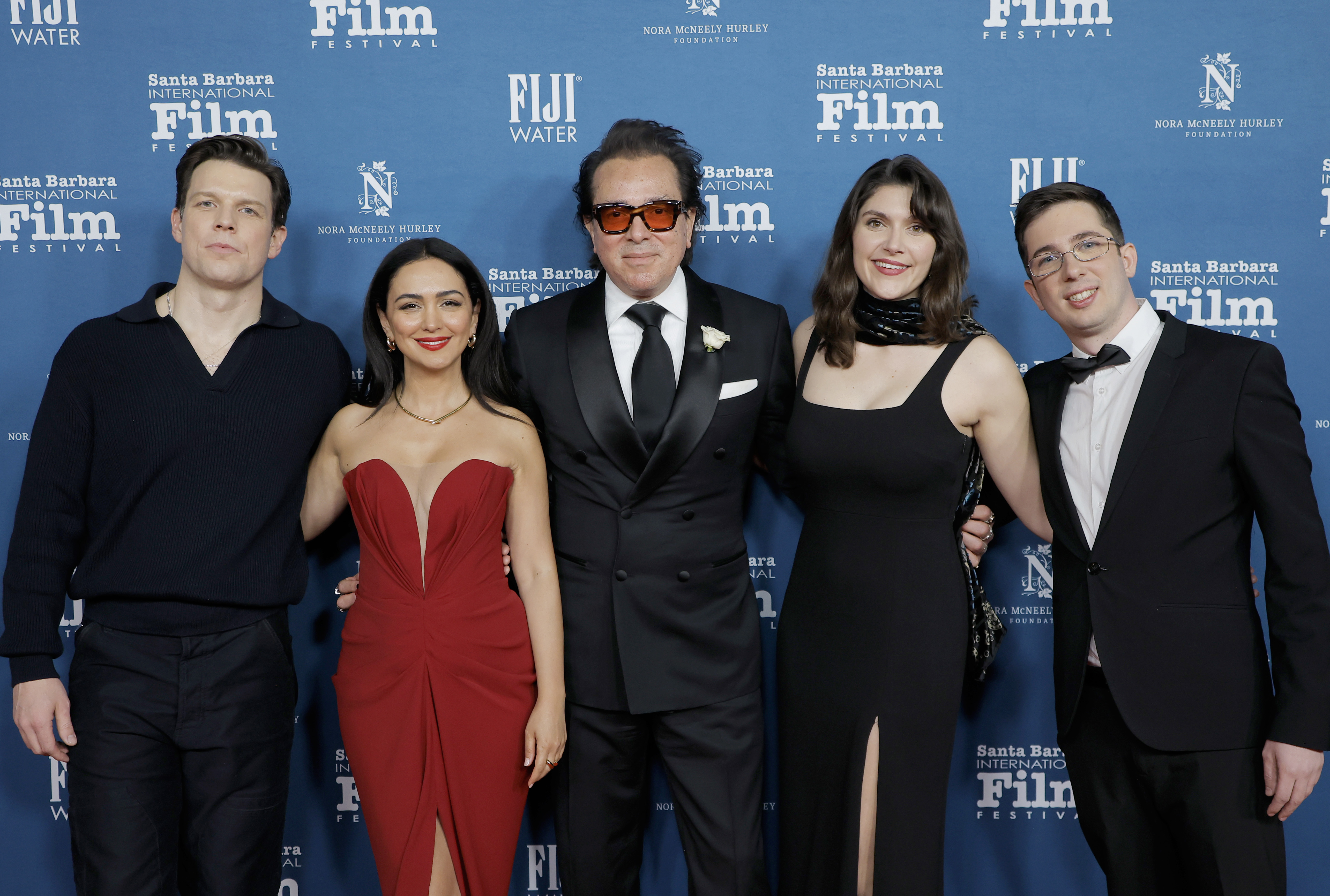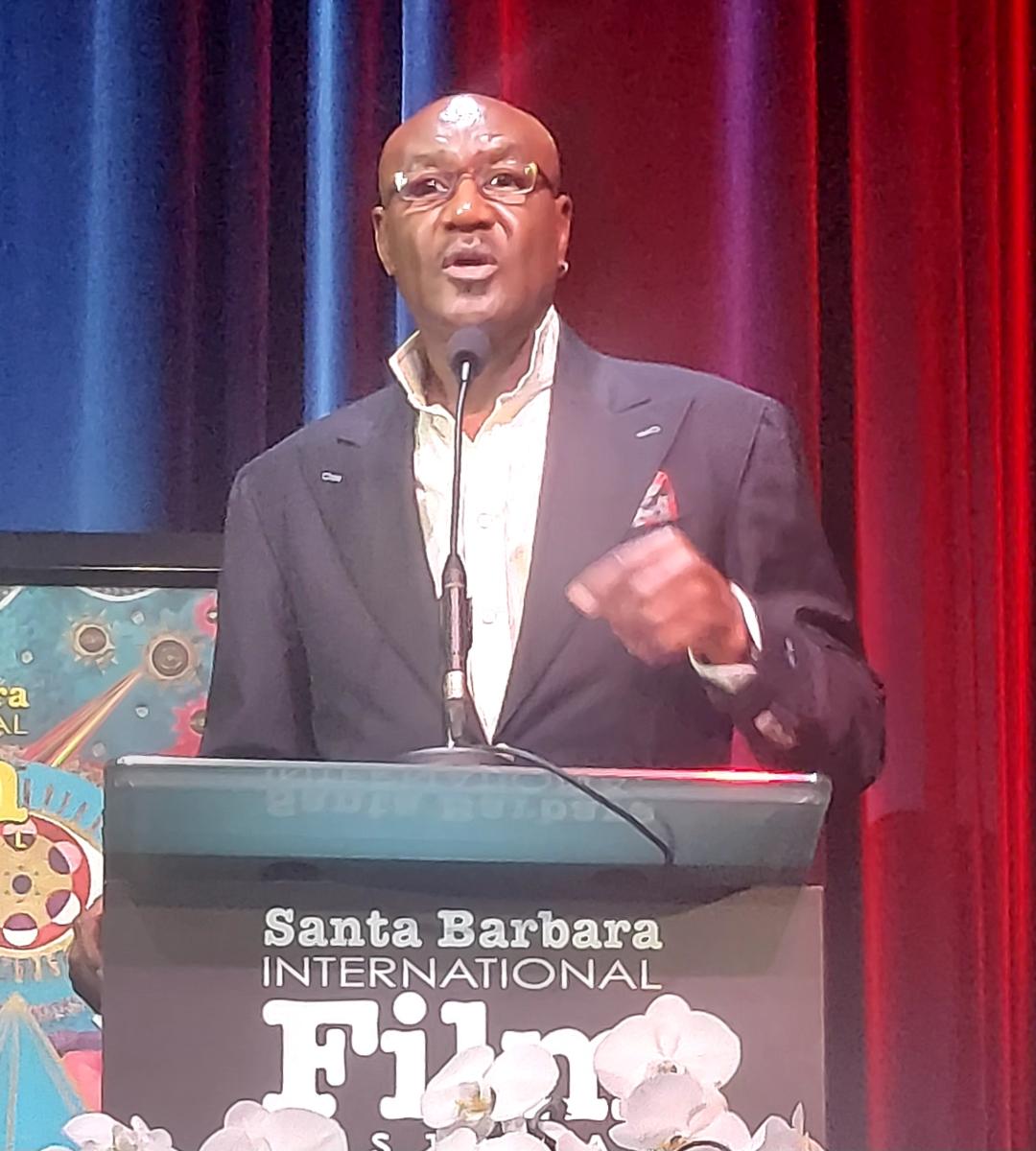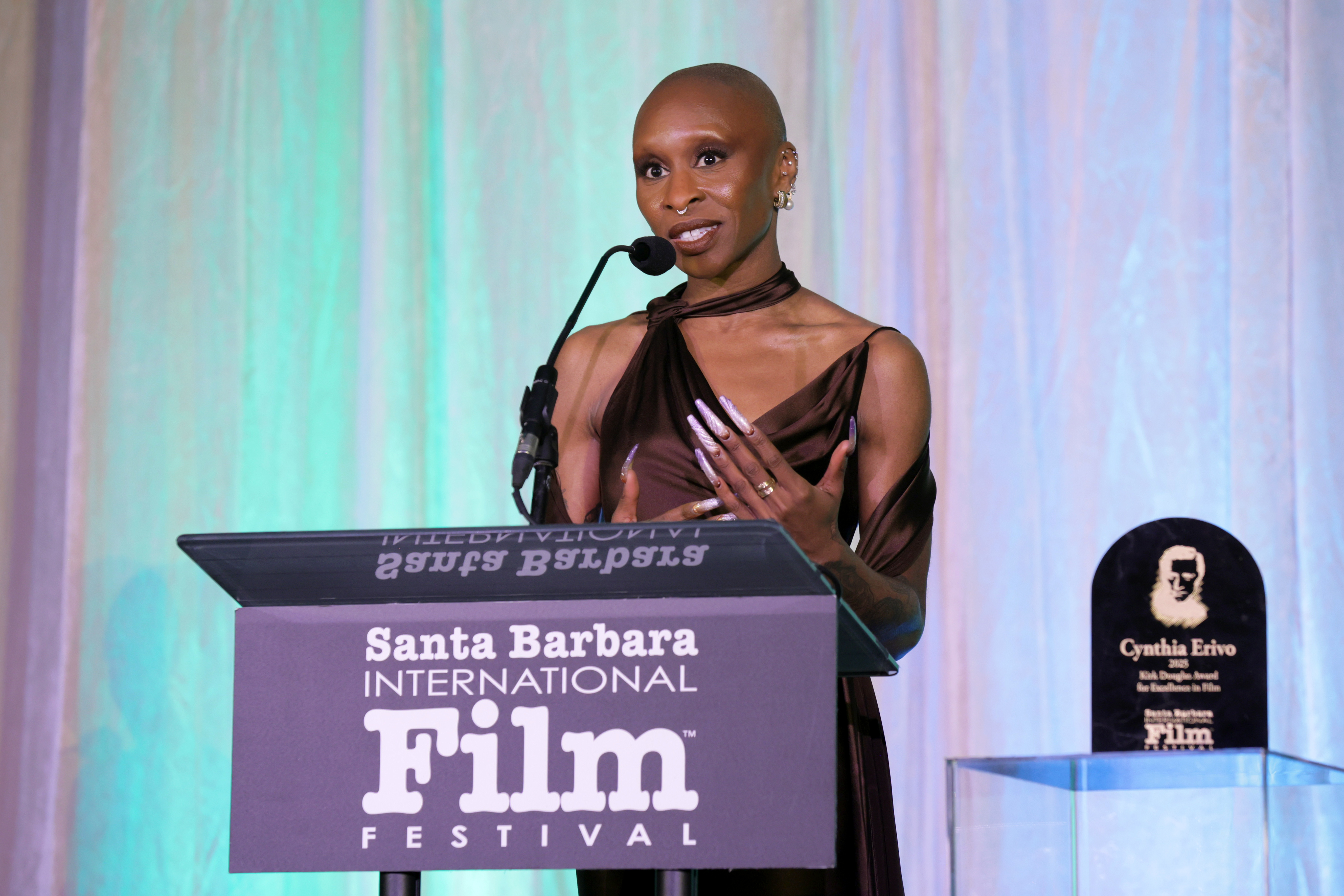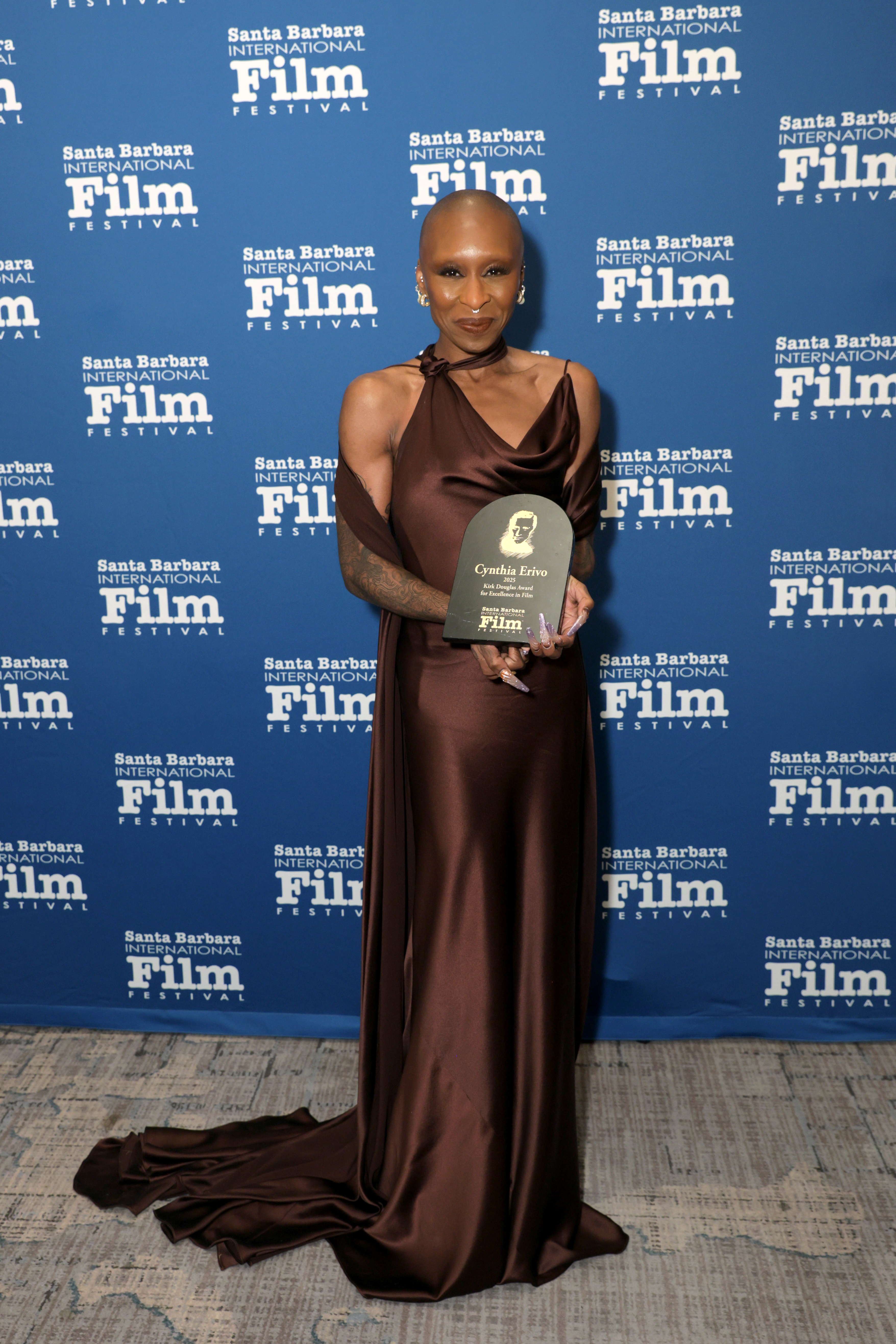TINSLE TOWN TIDBITS . . . THAT’S A WRAP 41st Annual Santa Barbara International Film Festival Selected Highlights By Bonnie Carroll 
This could have been one of the brightest and best Santa Barbara Film Festivals yet, but I’ve been saying that every year for so many years. I never cease to be amazed at the aura of excitement that fills our city each year, and it is such an honor to be a small part of the army of film loving locals who make Santa Barbara International Film Festival, considered among the best ten festivals in the world, once again live up to everyone’s highest expectations to be amazing at bringing many of the brightest stars to our renowned SBIFF Arlington Theatre Red Carpet, and attracting filmmakers from around the world to share their outstanding work. It is such a unique experience to be enjoyed and savored by area residents and visiting film lovers who keep coming back every year. Let’s face it forty-one years is a pretty impressive history. Below please enjoy my personal running record of delight’s enjoyed during this 41st SBIFF. 10 DAYS OF FILM MAGIC AT 2026 SBIFF My opening day adventures included a visit to the brand-new SBIFF McHurley Film Center where workers were frantically putting on finishing touches for SBIFF 2026 film presentations. Films from around the world were enjoyed by attendees throughout the festival, and I was delighted to speak with the project manager Andrew and one of his workers Angel who offered a brief tour. The McHurley Film Center is an outstanding venue for current and future community film presentation needs, and it is beautiful! Films throughout the ten-day festival were also shown at SBIFF Riviera Theatre near the El Encanto Hotel.  

Tour of McHurley SBIFF Film Center at 916 State Street 
OPENING NIGHT FILM “A MISQUITO IN THE EAR” 
Misquito in the Ear Film Members on Red Carpet with SBIFF Executive Director Roger Durling (Photo: Becky Sapp, Getty) Day one included some 'woman on the street' fun at the Arlington Theatre meeting local friends like Carolyn Jabs, President of the Women’s Fund for SB and her husband, who are both big supporters of SBIFF, and were looking forward to seeing the Maltin Modern Master Award presented to Adam Sandler. Also met people who traveled to the festival from around the country as well. Roger Durling, Executive Director of SBIFF, was a surprise sight out there talking to early arrivals who were waiting to greet all the celebrities walking the red carpet and were hoping to get autographs from Adam Sandler.   
Carroll on State Street – Chats with the Jab’s festival supporters - savoring Carlito’s shrimp salad – getting a personal welcome from SBIFF Executive Director Roger Durling (photos: BCarroll, LBN) I adored my annual quick dinner at Carlito's Mexican Restaurant while watching SBIFF staff setting up the red-carpet entry accoutrement and spoke with a Montana couple who were vacationing in Santa Barbara and were thrilled to have an opportunity to attend the SBIFF events. Big kudos to all the volunteers who make this magic happen every night at the Arlington, as well as all the additional festival venues. ADAM SANDLER PRESENTED THE SBIFF MALTIN MODERN MASTER AWARD   
Presenter Dustin Hoffman, Leonard Maltin Interview, Adam Sandler Thankyou Message (photos: BCarroll, LBN) It was a fabulous funny evening at the Arlington Theatre filled with belly laughs watching red carpet arrivals, Leonard Maltin Interviewing Sandler and sometimes Sandler interviewing Maltin, leading up to the presentation of the Maltin Modern Master Award, an award which recognizes an individual who has enriched our culture through their accomplishments in the motion picture industry, as well as his outstanding work in film. Leonard Maltin did a great interview with entertaining clips from many of Sandler's beloved films and the audience enjoyed every minute. Longtime friend and film associate Dustin Hoffman presented the award to Sandler, finishing his presentation by sharing that Sandler was not only one of the funniest talents in the business but was also an amazing human being. This was an evening of pure love and respect, along with uncontrollable laughter. I was so grateful to be there to see this special tribute given to Adam Sandler. AMERICAN RIVIERA AWARD WENT TO ETHAN HAWKE 
Jeff Bridges Presented Ethan Hawke with American Riviera Award (photo: Becky Sapp, Getty) The Ethan Hawke American Riviera Award, an award recognizing outstanding achievement in American film was Presented by Jeff Bridges, Academy Award and Golden Globe Award-winner, who joined Hawke in signing autographs and greeting the huge crowd of fans outside the Arlington Theatre. Dave Karger moderated a conversation on stage where notable performances were discussed. Santa Barbara locals were delighted to see Jeff Bridges, one of their own, present this award to Hawke. WOMEN’S PANEL 
After an early morning breakfast at Renaud’s I was off to a favorite event The Women’s Panel at the Arlington Theatre, moderated by Madelyn Hammond, President of Madelyn Hammond & Associates, where the 2026 panel included Yvett Merino Forthcoming , Producer Zootopia 2 Natalie Musteata, Writer/Director – Two People Exchanging Saliva, Alisa Payne, Producer – The Perfect Neighbor, Ashley Schalaifer, Producer – Train Dreams, Laia Casanovas, Sound – and all shared the frustrations and joys of working on great film teams they had been an important part of in 2025. This panel discussion is a must for all on the back history of individual working experiences in award-winning films. (Photo: BCarroll, LBN) TOTAL COMFORT AT NEW SBIFF FILM CENTER  I Adored viewing festival films at the beautiful new SBIFF Film Center on State Street, with totally comfortable seats, where great sound systems abound. I chatted with locals and out-of-town visitors in line waiting to see “If These Walls Could Rock” the funny and amazing story of the Sunset Marquis Hotel in West Hollywood that was home for years to countless major ‘bad boy’ rock stars. Based on a book If these Walls Could Rock by Mark Rosenthal and Craig A. Williams. (Photo: BCarroll, LBN)
VARIETY ARTISAN AWARDS

The Variety Artisan Awards celebrated professionals who are essential to the filmmaking process honored Alexandre Desplat (Frankenstein), EJAE (KPOP Demon Hunters), Jack Fisk (Marty Supreme), Kate Hawley (Frankenstein), Mike Hill (Frankenstein) Andy Jurgensen (One Battle After Another), Al Nelson(F1), Adolpho Veloso (Train Dreams), Eric Saindon (Avatar: Fire and Ash) and Chris Welcker (Sinners). (Photo: Becky Sapp, Getty) VIRTUOSOS AWARD 
The Virtuosos Award presented by Nora McNeely Hurley Foundation, narrated by Actress Jane Byrne The Virtuosos Award Virtuosos Award honors contemporary cinema actors for breakthrough performances and included Jacob Elordi (Frankenstein), Chase Infiniti (One Battle After Another), Inga Ibsdotter Lilleaas (Sentimental Value), Amy Madigan (Weapons), Wunmi Mosaka (Sinners), Wagner Moura (The Secret Agent), Sydney Sweeney (Christy), Tenyana Taylor (One Battle After Another). (Photo: Getty) HAMMOND CINEMA VANGUARD AWARD The Pete Hammond interviews with these three amazingly talented actors was so informative and such a treat, with details on each of their career challenges and unexpected gifts. 
Moderator Pete Hammond, Award recipients Sean Penn, Benicio Del Toro, Leo DiCaprio with Director Paul Thomas Anderson (photo: BCarroll, LBN)  THE MAGNIFICENT THREE - Sean Penn, Benicio Del Toro & Leo DiCaprio enjoying Hammond Cinema Van Guard Award moment (photo: BCarroll, LBN) 
Bonnie Carroll, SBIFF LBN Reporter on the Street, with Mr. SYV Shelby Sym and Amy Sym Doing my reporter on the street best I was Delighted to see Shelby Sim, President and CEO of Visit Santa Ynez Valley, and wife Amy Sim at Opal Restaurant enjoying the festival experience on their way to the Arlington Theatre before the red carpet for Hammond Cinema Vanguard Award, and I was happy to catch up on latest delicious Restaurant Week news in Santa Ynez Valley. 41ST SBIFF DIRECTORS AWARD These brilliant brave hearts arrived at the red carpet in one horrible storm, but graciously posed for photos and greeted fans who had waited for them in the torrential rain. The Award ceremony and interview were excellent and highly informational regarding their outstanding work, and individualized approach to their award winning films. 
Ryan Coogler (Sinners), Josh Safdie (Marty Suprime), Joachim Trier (Sentimental Value), and Chloe Zhao (Hamnet) (SBIFF Photo) Stellan Skarsgard Montecito Award Recipient 
Actor Stellan Skarsgard at the Podium (photo: Getty) Famed Swedish Actor Stellan Skarsgard 74, who began his acting career at 10 years of age, was honored with the Montecito Award at the 41st Annual Santa Barbara International Film Festival (SBIFF) on Wednesday, February 11 in an evening that spotlighted his widely acclaimed turn in Joachim Trier’s Sentimental Value. Skarsgard shared stories on his acting career, which included more than 120 films since his film debut at age 20, with editor-at-large for IndieWire Anne Thompson. Mike’s Field Trip to the Movies 
Each year over 800 area school kids are bused to the Arlington Theatre for a movie field trip that is always fun to watch. I stood outside the theatre and asked kid’s how they like it and they all shared it was fun and they “loved it”! Many thanks to SBIFF staff, the teachers and volunteers and film makers who make this magical movie day possible for local kids! Outstanding Performer of the Year – Michael B. Jordan  
SBIFF Executive Director Roger Durling congratulates Michael B. Jordan - Delroy Lindo presents SBIFF Outstanding Performer Award (photo: BCarroll) Michael B. Jordan stepped on stage at the Arlington Theatre to be greeted by a full house of very enthusiastic fans, along with his entire family, who thoroughly enjoyed his interview with Roger Durling, Executive Director of the Santa Barbara International Film Festival. Michael’s first action was to give a grateful ‘heads up’ to his lovely mother Donna Jordan, and family members Jamila Jordan and Khalid Jordan sitting in the audience. Roger Durling moderated the interesting career history and variety of film clips that were so enjoyed by the audience. The amazing film history of this exciting young actor/director is commendable, as well as his great love affair with film, the craft of acting and then directing. Fans in the audience were delighted to learn from Jordon that there will be a Creed 4! 
Actor Delroy Lindo honoring Michael B. Jordan (photo: BCarroll) Delroy Lindo, long-time friend and film associate (who played a prominent role in Sinners, written and directed by Ryan Coogler) presented the award with so much love and very touching words of admiration for Michael B. Jordan the actor, director and dear friend. Delroy was nominated for an Oscar as Best Supporting Actor in Sinners, with Michael B. Jordan who was nominated for a Best Actor award. I viewed the film just before this award presentation and can easily see why it has been given so much aclaim. This amazing film received 16 nominations for the 98th Academy Awards to be held at the Dolby Theatre in Hollywood on March 15, 2026. Kate Hudson – Arlington Artist of the Year 2026  
Gwyneth Paltrow Presented the SBIFF Award to Kate Hudson (photo: BCarroll) The 2026 Arlington Artist of the Year Award was presented to Academy Award nominee Kate Hudson, which was presented by Academy Award, Golden Globe Award, Primetime Emmy Award winning actress and long-time friend Gwyneth Paltrow. The evening spotlighted Hudson’s performance in Craig Brewer’s critically acclaimed musical drama, Song Sung Blue, for which she was also nominated for a Golden Globe Award and a SAG Actor Award. The evening additionally celebrated her film career of more than two decades, spanning her work in Almost Famous; How to Lose a Guy in 10 Days; Raising Helen; You, Me and Dupree; Nine; Deepwater Horizon; Marshall and Glass Onion: A Knives Out Mystery. The conversation also touched on her music career and recent Netflix television show, Running Point. Hudson is the second person to receive this award from SBIFF. Timothée Chalamet received the inaugural award in 2025. Closing Day & Closing Film “Laundry” “Laundry” was the closing evening film, preceded by a Writer’s Panel, and daytime 10-10-10 Film Competition and Student Shorts that attracted supportive crowds to watch the work created by talented area youth. The 2026 Audience Choice Awards sponsored by The Santa Barbara Independent were announced and presented at a media breakfast at El Enconto on Valentine’s Day morning and winners included: STEAL THIS STORY, PLEASE Directed by Tia Lessin and Carl Deal Panavision Spirit Award for Independent Cinema A MOSQUITO IN THE EAR Directed by Nicola Rinciari The Jeffrey C. Barbakow Award for Best International Feature Film ADAM'S SAKE Directed by Laura Wandel The Best Documentary Award GASLIT Directed by Katie Camosy The Nueva Vision Award for Spain/Latin America Cinema VERSAILLES Directed by Andrés Clariond Rangel The Best Animated Short Film Award PAPILLON Directed by Florence Miailhe The Best Documentary Short Film Award A SHORT DOCUMENTARY ABOUT A GIANT PENCIL Directed by Daniel Straub The Best Live-Action Short Film Award AGNES Directed by Nora Arnezeder The Social Justice Award sponsored by the Fund for Santa Barbara STEAL THIS STORY, PLEASE Directed by Tia Lessin and Carl Deal The ADL Stand Up Award sponsored by ADL Santa Barbara/Tri-Counties BOOKENDS Directed by Noam Ash The ASC Award for Best Cinematography sponsored by The American Society of Cinematographers LOST LAND Directed by Akio Fujimoto The winning films were selected by SBIFF 2026 jury members Adam Guettel, Adrien Martinez, Jordana Brewster, Joseph Novoa, Karla Quintero, Langdon Page, Marissa Chibas, Michael Patti, Tina Sawtelle and Travis Preston. ABOUT THE SANTA BARBARA INTERNATIONAL FILM FESTIVAL The Santa Barbara International Film Festival (SBIFF) is a 501(c)(3) non-profit arts and educational organization dedicated to discovering and showcasing the best in independent and international cinema. Over the past 40 years, SBIFF has become one of the leading film festivals in the United States – attracting 100,000 attendees and offering 11 days of 200+ films, tributes, and symposiums, fulfilling their mission to engage, to engage, enrich, and inspire through film. Sponsors of the 41st SBIFF include: Nora McNeely Hurley Foundation, FIJI Water, Santa Barbara City, Yardi, Variety, The Hollywood Reporter, Deadline, Panavision, John C. Mithun Foundation, US Bank, Sonos, The Veraison Fund, Montecito Bank & Trust, The Fund for Santa Barbara, ADL Santa Barbara/Tri-Counties, Kaleidoscope Productions, Patagonia, Film Florida, Towbes Fund for the Performing Arts, American Society of Cinematographers, The Santa Barbara Independent, Hobson/Lucas Family Foundation, Bentson Foundation, Morton Family Foundation, Zegar Family Fund, Volentine Family Foundation, Toad&Co, El Encanto, Longoria Wines, Topa Topa Brewing Company, Nosotros Tequila & Mezcal, and many more generous supporters through donations and trade. SBIFF continues its commitment to education and the community throughout many free educational programs and events. SBIFF’s programs support over 18,000 kids, students and families in the local community by introducing film as an art form to young children with programs like AppleBox and Mike’s Field Trip to the Movies; teaching film analysis to high school and college students with programs like Rosebud and the Film Studies Program; and teaching the craft of screenwriting and filmmaking with Film Camp and 10-10-10 Mentorship programs. Most importantly SBIFF’s programs are always directed towards the under-represented and under-served communities within Santa Barbara County. More recently, SBIFF secured a long-term lease for the iconic multiplex at 916 State Street in the heart of downtown Santa Barbara. This landmark acquisition and recent renovation of a state-of-the-art Film Center will be a vibrant, year-round destination that will serve as a central hub for cinema enthusiasts and the heart of SBIFF’s renowned Film Festival. Building on the success of the Riviera Theatre revitalization in 2016 and the opening of its own Education Center in 2019 in the downtown area, SBIFF continues to strengthen its commitment to the cultural fabric of Santa Barbara. MANY THANKS … IT TAKES A VILLAGE City of Santa Barbara residents and volunteers and SBIFF staff are always grateful to the generous and caring sponsors who make Santa Barbara International Film Festival possible each year. This year’s sponsors included: Premiere Sponsor Nora McNeely Hurley Foundation, Supporting Sponsors: FIJI Water, Panavision, DEADLINE, The Hollywood Reporter, Variety. Contributing Sponsors: USbank, Montecito Bank, Yardi, Bella Vista Designs, Inc. Community Sponsors: Patagonia, SONOS, The Fund for Santa Barbara, ADL SB Tri-counties, ESCOPE, Longoria Wines, ASC, DELL Technologies, NOSOTROS Tequila, DENTONS, Don’t Wonder Productions, El Encanto, PALOMA, LURE, MISIC ACADEMY OF THE WEST, OLIO BOTEGGA, ROOT Kitchen Catering, Santa Barbara Airport, SB Design Center, Savior Faire, Tamsen gallery, TOPA TOPA West Beach Films, yts Films. Media Partners: edhat Santa Barbara, El Latino, IndieWire, News Channel 3, 92.9 KJEE, KRUZ 103.3, Noozhawk, LBN, SB Independent, SBLS, Santa Barbara, K-Lite-KTYD-KTMS, VOICE Magazine. Hospitality Partners: El Encanto, Hotel California, Holiday Inn Express, SYR, SB Hotel Collection, The STEWARD, Santa Barbara Inn, The MILO, LA PLAYA INN, Riviera Beach Hotel, The Ritz-Carlton Bacara, Courtyard by Marriott, Secret Garden Inn & Cottages, Hilton Santa Barbara Beachfront Resort, AJB, Driftwood Properties, The Dux. Culinary Partners: PALOMA, The LARK, Loquita, Olio Restaurantes, ROOT Kitchen, Savoir Faire, DOMS, DUSK, Etty’s Jewish Deli & Bakery, The Grazing Place, Nimita’s Cuisine, Rascals Vegan Room. Participating Partners: Cox Communications, Darian Bleecher Creative, Film Florida, Haagen Printing Typecraft, Inc, Simply Cocktails, Toad & Co, V3 Printing. Foundations: Bentson Foundation, Hobson Lucas Family Foundation, John C. Mithun Foundation, Morton Family Foundation, Towbes Fund for the Performing Arts, A Field of Interest Fund of the Santa Barbara Foundation, The Veraison Fund, Volentine Family Foundation, Zegar Family Fund. Spartacus Circle: Lynda Weinman and Bruce Heavin, Nora McNeely Hurley and Michael Hurley, Pam and Russ Strobel, Besty Englis, In memory of Eugenia Riordan Mule, John C. Mithun Foundation, Michael and Tracy Bollag, The Wyatt Families, Julianna and Tom Dain. Looking forward to our 42nd Annual Santa Barbara International Film Festival and many thanks to all the long-time friends, film folks, dedicated volunteers, media associates, and the entire SBIFF staff for yet another ten days of unforgettable memories. Bonnie Carroll, www.lifebites.news.com & www,coastingwithbonnie.com 
≈≈≈ 
SBIFF ANNUAL KIRK DOUGLAS AWARD Here's the Story . . . Cynthia Erivo Award 
Cynthia Erivo accepts SBIFF Kirk Douglas Award at Ritz-Carlton Bacara Dinner (Photo: Rebecca Sapp/Getty Images for SBIFF) 2025 SBIFF KIRK DOUGLAS AWARD FOR EXCELLENCE IN FILM WENT TO CYNTHIA ERIVO ON DECEMBER 4 AT RITZ-CARLTON BACARA RESORT By Bonnie Carroll Having been blessed with the opportunity to cover this amazing SBIFF evening honoring excellence in film since its inception, which has been presented to the best of the best over the years, I was overjoyed to know the multi-talented Cynthia Erivo would be the Kirk Douglas Award for Excellence in Film recipient for 2025. Cynthia Erivo’s personal history of working hard to achieve her dreams, and the outstanding awards she has won including multiple Oscar nominations for her Harriet Tubman role (2020) Best Actress and Best Original Song, and Best Actress for her role in Wicked (2025). Her performance in The Color Purple won her a Tony Award for Best Actress in a Musical and Drama Desk Award for Outstanding Actress in a Musical, and Daytime Award for Outstanding Musical Performance in a Daytime Program and the Grammy Award for Best Musical Theater Album alongside the cast of The Color Purple made her the perfect choice to receive this year’s Kirk Douglas Award for Excellence in Film. The Santa Barbara International Film Festival celebrated Cynthia Erivo with the SBIFF Kirk Douglas Award for Excellence in Film December 4th at the Ritz-Carlton Bacara Resort in Santa Barbara at their black-tie dinner before an audience of film makers, admirers, award supporters, sponsors, fans and friends. The prestigious award presentation marked the fourth time the prestigious award, which benefits the film festival’s year-round educational programs was presented at the Ritz-Carlton Bacara since the passing of screen legend Kirk Douglas. Ernesto Paredes, President of the SBIFF Board highlighted the festival’s new 5-plex film center in downtown Santa Barbara that represents a significant investment in the future of the festival and thecommunity's artistic vibrancy, as well as in the revitalization and beautification of downtown. The McHurley Film Center will be a state-of-the-art cinema that will allow SBIFF to expand their year-round programming of independent, foreign, documentary, retrospective and family-friendly films, to grow educational programs and offer greater accessibility to the community. The city buzz is the Santa Barbara community is looking forward with great anticipation to experiencing the 2025 film festival submissions in the outstanding new McHurley Film Center. 
Jon M. Chu, SBIFF Executive Director Roger Durling, honoree Cynthia Erivo, and Marc Platt celebrating the Kirk Douglas Award. (Photo: Rebecca Sapp/Getty Images for SBIFF). Executive Director Roger Durling took the stage to commend Cynthia Erivo’s incredible transformative power as a performer. Starting with her role as Celie in The Color Purple, Roger said seeing her “was like witnessing a hurricane” and he was “in awe of her strength, her beauty and her expressiveness… Knowing I had witnessed something historic – not just a great performance – but the birth of a star like I’d never seen before.” Guests saw clips of her performances from Widows to Bad Times at the El Royale, to Harriet, Poker Face, Pinocchio and Genius: Aretha. Transitioning to Cynthia’s work this year in Wicked: For Good, Roger congratulated Cynthia for her inspiring performance in one of the most challenging, complex and compelling characters cinema has given us. The award program featured a speech by Tony, BAFTA, and Emmy-award winning producer Marc Platt who celebrated Cynthia’s outstanding filmography, who noted that they couldn’t move forward with making Wicked until they found their Elphaba. “Thank Oz for Cynthia Erivo!” Jon M. Chu, award-winning film director, presented Cynthia Erivo with the 2025 Kirk Douglas Award. He spoke about how she “makes the impossible feel inevitable” as he celebrated Cynthia Erivo’s continued dedication to artistry and achievement in film. “This is my sister. My defiant, brilliant, bad-ass witch. But she’s not mine, she belongs to herself. I am only the witness with a very expensive camera,” Chu praised. “She loves humanity even when humanity doesn’t know what box to put her in because she’s bigger than the box. Some would say she defies gravity.” Cynthia Erivo accepted the award, saying “Thank you to the Santa Barbara Film Festival for this extraordinary honor, and all of you in this room for contributing to education programs that will continue to inspire the next generation of film artists. We need them. … When I think of the last recipients, I realize I am still a student, and I will continue to be as time goes by because art does that. Thank you for this because it reminds me, yes, of how far I’ve come, but also how much more I have to go. And this is a beautiful pit stop along the way. So, thank you, thank you to my entire team, and thank you again to Santa Barbara Film Fest for this lovely recognition." 
Cynthia Erivo posing with her Kirk Douglas Award at the Ritz-Carlton Bacara Resort. (Photo: Rebecca Sapp/Getty Images for SBIFF). Since 2006, the annual Kirk Douglas Award for Excellence in Film has been awarded to a lifelong contributor to cinema through their work in front of the camera, behind, or both. Past honorees include Will Ferrell, Ryan Gosling, Michelle Yeoh, Martin Scorsese, Hugh Jackman, Dame Judi Dench, Warren Beatty, Jane Fonda, Jessica Lange, Forest Whitaker, Robert De Niro, Michael Douglas, Harrison Ford, Quentin Tarantino, Ed Harris, and John Travolta. Sending congratulations and much happiness to the 2025 Kirk Douglas Award recipient Cynthia Erivo from one of her many fans!!! About the Santa Barbara International Film Festival: The Santa Barbara International Film Festival (SBIFF) is a 501(c)(3) non-profit arts and educational organization dedicated to discovering and showcasing the best in independent and international cinema. Over the past 40 years, SBIFF has become one of the top 10 film festivals in the United States – attracting 100,000 attendees and offering 11 days of 200+ films, tributes and symposiums, fulfilling their mission to engage, enrich, and inspire through film. In 2016, SBIFF acquired the historic and beloved Riviera Theatre. After a capital campaign and renovation, the theatre is now SBIFF’s state-of-the-art, year-round home, showing new international and independent films every day. In 2019, SBIFF opened its own Education Center in downtown Santa Barbara on State Street to serve as a home for its many educational programs and a place for creativity and learning. In 2024, with support from the City of Santa Barbara, SBIFF acquired SBIFF’s Film Center; a 5-plex movie theatre at 916 State Street in the heart of downtown. Soon the theatre will have a state-of-the-art renovation and will exponentially elevate SBIFF’s impact to new heights as well as secure the future of the annual 11-day Film Festival. SBIFF continues its commitment to education and the community throughout many free educational programs and events. SBIFF’s programs support over 18,000 young people, students and families in the local community by introducing film as an art form to young children with programs like AppleBox and Mike’s FieldTrip to the Movies; teaching film analysis to high school and college students with programs like Rosebud and the Film Studies Program; and teaching the craft of screenwriting and filmmaking with Film Camp and 10-10-10 Mentorship programs. Most importantly SBIFF’s programs are always directed towards the under-represented and under-served communities within Santa Barbara County. For SBIFF Festival information or tickets visit www.SBIFF.org. ♦ ♦ ♦ .jpg) Look for Oscar News Here! Oscar Nominee's gathered at the Annual Luncheon held at the Beverly Hilton Hotel on Tuesday Feburary 10. It was a last group get-to-gether before the 98th Oscar Awards on Sunday, March 15, 2026 to be held at the Dolby Theatre, and televised on ABC. 
Oscar Nominees 2026 Rose Byrne, Emma Stone, Timothee Chalamet, Teyanna Taylor, Leo DiCaprio, Michael B. Jordan, Kate Hudson, and Elle Fanning gathered for the 98th Oscar nominees annual photo. (Getty Photo) ♦ ♦ ♦
|







